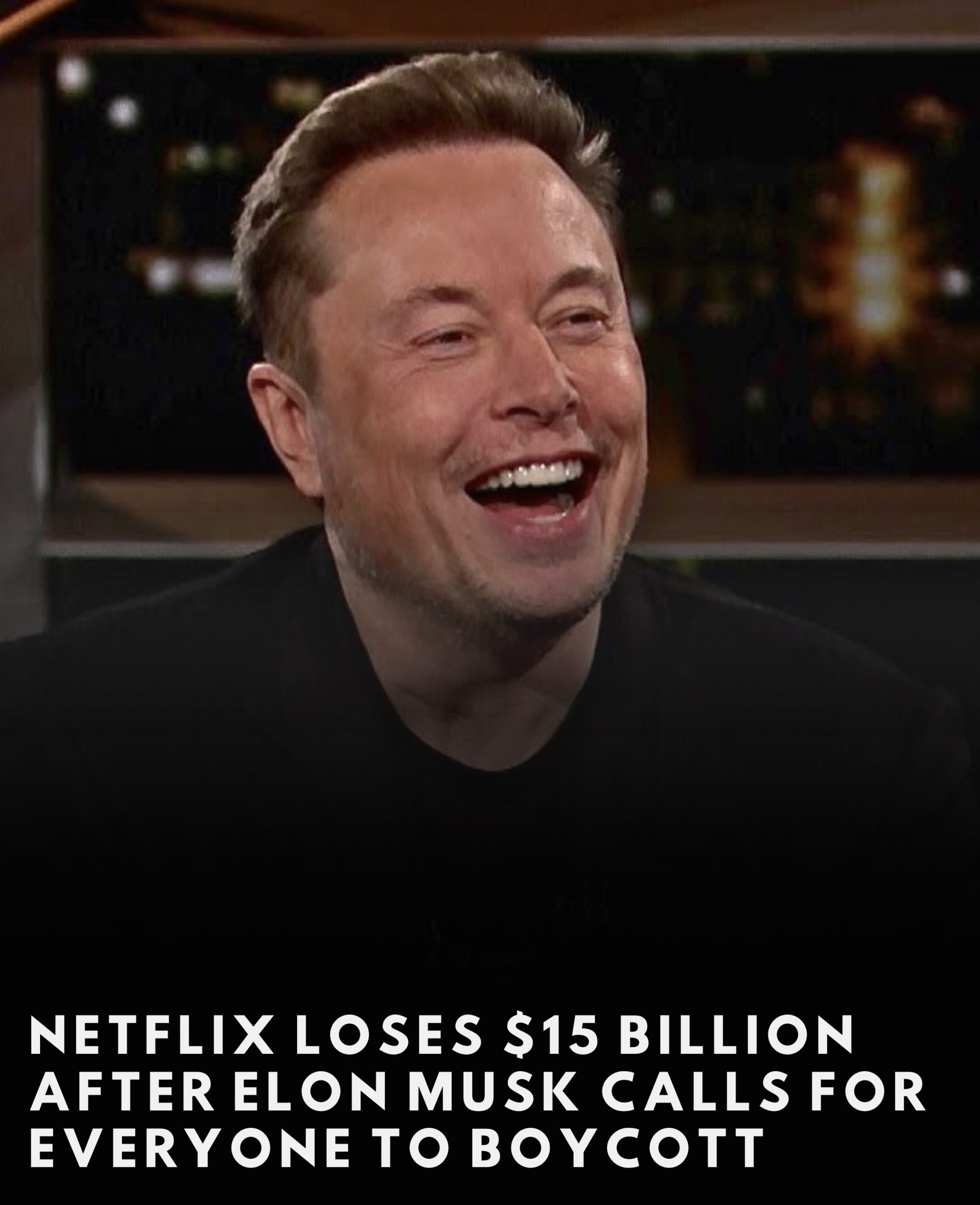Netflix shed more than $15 billion in market value over two sessions after Elon Musk urged his millions of followers to cancel their subscriptions, intensifying a backlash over transgender representation in a children’s series and reviving questions about the streaming company’s exposure to politically driven consumer boycotts. The slide came as the Tesla and SpaceX…

Netflix shed more than $15 billion in market value over two sessions after Elon Musk urged his millions of followers to cancel their subscriptions, intensifying a backlash over transgender representation in a children’s series and reviving questions about the streaming company’s exposure to politically driven consumer boycotts. The slide came as the Tesla and SpaceX chief repeated calls to “Cancel Netflix for the health of your kids,” amplifying a clip from the animated show “Dead End: Paranormal Park” in which the teenage protagonist identifies as transgender. Shares fell across consecutive trading days this week, trimming the Los Gatos-based company’s market capitalization from roughly $498 billion to about $483 billion in the period that followed Musk’s posts, according to publicly available pricing and market-cap data. Netflix declined to comment on the campaign.
Musk’s criticism centred on the show’s inclusion of a trans lead, which he framed as inappropriate for children, while reposting memes that described a “transgender woke agenda” and accused Netflix of pushing political messages. “This is not ok,” he wrote in one early post as he boosted a clip originally shared by the activist account Libs of TikTok. He followed with multiple messages over subsequent days, including the admonition to cancel subscriptions, and highlighted other Netflix programs that feature LGBTQ+ characters or themes. The billionaire’s personal life has intersected with the subject in recent years; he is estranged from his transgender daughter, Vivian Jenna Wilson, and has said in interviews that the “woke mind virus” had “killed” his child, comments that drew condemnation from advocacy groups and public figures.
The creator of “Dead End: Paranormal Park,” Hamish Steele, said the renewed attention had brought a wave of abuse and announced a break from social media after receiving messages he described as homophobic and antisemitic. The two-season series, adapted from Steele’s “DeadEndia” graphic novels, premiered in 2022 and was cancelled in 2023 but remains available on Netflix. Its protagonist, Barney Guttman, is a trans teen voiced by Zach Barack, who defended the show and its impact, saying “kids & parents have told me it saved their lives!!” The series carries a TV-Y7 rating, indicating it is intended for children aged seven and older. Supporters of the program say it offers representation that helps young viewers see their experiences reflected on screen, while critics accuse the platform of politicising children’s entertainment.
The sell-off in Netflix shares unfolded as Musk posted or reposted boycott messages dozens of times, an escalation that mirrors prior episodes in which his interventions have roiled corporate reputations or stock prices. In the past two years he has urged followers to delete applications, boycott brands and “defund” organisations after high-profile disputes, and advertisers have periodically fled his social media platform, X, over content moderation controversies. While the causal relationship between online campaigns and market moves is seldom clear-cut, investors treated this week’s pressure as a fresh headline risk for a company that has previously weathered ideological flare-ups without lasting damage to its subscriber base. In 2020, outrage over the French film “Cuties” produced a short-lived spike in cancellations that faded within days; in 2021, employee walkouts over Dave Chappelle’s specials prompted leadership to defend “artistic freedom” while reaffirming wide-ranging programming.
The latest controversy arrives with Netflix in a stronger financial position than during earlier cycles of outrage, following a year of subscriber growth, password-sharing crackdowns and price increases that lifted revenue and margins. Even so, its market value remains sensitive to sentiment swings and to concerns that prolonged boycotts—however unlikely to endure—could slow user growth or complicate content strategy. The company has cultivated a vast and eclectic catalogue that includes faith-based titles, conservative comedians and politically themed documentaries across the spectrum, alongside heavily promoted queer and trans-inclusive programming. Executives have long argued that breadth is essential to serving a global audience and that not every title is for every viewer. That stance has not insulated Netflix from periodic crossfire as culture-war battles spill into boardrooms and trading screens.
Musk’s volley drew support from conservative commentators and public figures who applauded the pushback against trans representation in children’s shows, and criticism from others who accused him of promoting the very “cancel culture” he often derides. The entrepreneur’s posts also revived scrutiny of his broader rhetoric around gender identity, including past allegations that he amplified misinformation and targeted individuals. For Netflix, the immediate operational implications were limited: there were no indications of emergency policy changes, content pulls or notable shifts in its children’s catalogue. But the board and top executives will face renewed questions about how the company explains its approach to representation, whether it adjusts curation or ratings guidance, and how it plans for potential volatility tied to online campaigns with outsized reach.
“Dead End: Paranormal Park” occupies a particular intersection of themes that tend to trigger backlash: youth-oriented animation, explicit identification of a trans lead and a platform with enormous cultural footprint. The show follows Barney and friends navigating supernatural adventures in a theme park while grappling with identity and family dynamics. At the time of its release, it drew praise for storytelling and inclusion from critics and viewers; it also attracted hostility from groups opposed to LGBTQ+ representation in children’s media. The resurfaced clip that Musk amplified was originally shared by an account known for targeting schools and entertainment with allegations of indoctrination. In line with past practice, Netflix did not remove the series in response to the outcry. Internally, the company has typically left decisions over renewals and cancellations to performance metrics and creative priorities rather than to social media storms.
Financial analysts surveyed this week noted that a two-day, low-single-digit percentage decline is not unusual for Netflix, which has a history of sharp post-earnings moves and intraday volatility. Some pointed to broader market jitters and sector rotations that can magnify headline-driven selling, while others said the timing suggested at least a short-term reaction to the boycott calls. The roughly $15 billion figure cited by market trackers reflects a simple arithmetic change in market capitalization across the period when Musk’s posts were proliferating, rather than a realised loss in assets or cash. Similar calculations have surfaced in prior controversies involving other brands, including beverage and retail companies that faced boycotts over LGBTQ+ themes. In many of those cases, stocks recovered as campaigns lost momentum and consumers returned to familiar habits.
The public debate sharpened long-standing questions about how streaming platforms rate, market and recommend kids’ content. Advocates for trans and queer youth argue that age-appropriate inclusion can be lifesaving and that representation helps counter stigma. Opponents insist there should be stricter limits on what children encounter in mainstream entertainment and accuse platforms of using children’s programming to advance social agendas. Industry standards rely on content ratings, parental controls and opt-in profiles to give families granular control, tools that Netflix often highlights in responses to campaigners on both sides. Whether those guardrails satisfy critics is likely to remain contested territory as more creators introduce characters and storylines that reflect a broader range of identities.
For Musk, the Netflix campaign unfolded as part of a wider pattern in which he has used his social media reach to pressure companies and institutions, sometimes alongside business interests and sometimes far afield from them. His posts this week frequently referenced broader claims about diversity initiatives and political donations by tech employees, and he tied the streaming dispute to complaints about schools and children’s media more generally. At one point he suggested Netflix was “actively pushing” transgender content on users, echoing the language of other conservative activists. The company’s algorithmic recommendations remain a black box to outsiders, but executives have repeatedly said the system responds to individual viewing history and preferences rather than steering viewers toward any particular political theme.
As the stock steadied late in the week, attention turned to whether the boycott calls would translate into a measurable rise in cancellations or a dip in sign-ups, metrics investors will scrutinise in Netflix’s next earnings report. Past episodes suggest that while social media can drive short-run spikes in account closures, long-term churn depends on price, content slate and competition rather than on political messaging alone. Netflix has spent heavily on international originals and franchise extensions to keep its pipeline full, and it has expanded advertising-supported tiers aimed at price-sensitive users. Those efforts, along with crackdowns on account sharing, have bolstered key metrics over the past year and given executives more room to ride out periodic storms.
The company’s leadership has addressed similar controversies by reiterating a few core principles: that it supports creators across a range of viewpoints, that employees may disagree about specific titles, and that not every show is intended for every audience. Co-CEO Ted Sarandos has previously defended specials and series that angered one constituency or another by invoking “artistic freedom.” That posture did not prevent staff walkouts in 2021, nor did it deter subscription spikes that followed major hits in subsequent years. Observers say the balance sheet now looks resilient enough to absorb headline shocks even as the political temperature rises, but they caution that protracted campaigns led by figures with outsized platforms carry unpredictable second-order effects, including on talent relations and regional licensing.
The latest flap illuminates the ongoing collision between culture-war politics and media business fundamentals. For investors, the lesson has been that big consumer platforms are not immune to waves of digital activism, but that market reactions often decouple from fundamentals once the initial surge of attention fades. For Netflix’s creative partners and employees, the episode underscores both the risks of being caught in a political crossfire and the importance of clear internal support when targeted online. For parents and viewers, it revives familiar arguments about what belongs in children’s storytelling and who decides.
By week’s end, Musk’s posts had ensured that a largely dormant show from 2022 was back in the centre of a global debate, Netflix’s stock had given up a sliver of its recent gains, and a streamer that prides itself on serving many tastes was again facing a test of how to manage programming in a polarised market. The company offered no public sign that it would alter its catalogue or policies in response to the pressure. The movement in its share price underscored that even the world’s largest entertainment companies can feel the tremors from a single account with a massive following. Whether the tremors settle into a crack will depend less on a week of posts than on the months of viewing and purchasing choices that follow.


